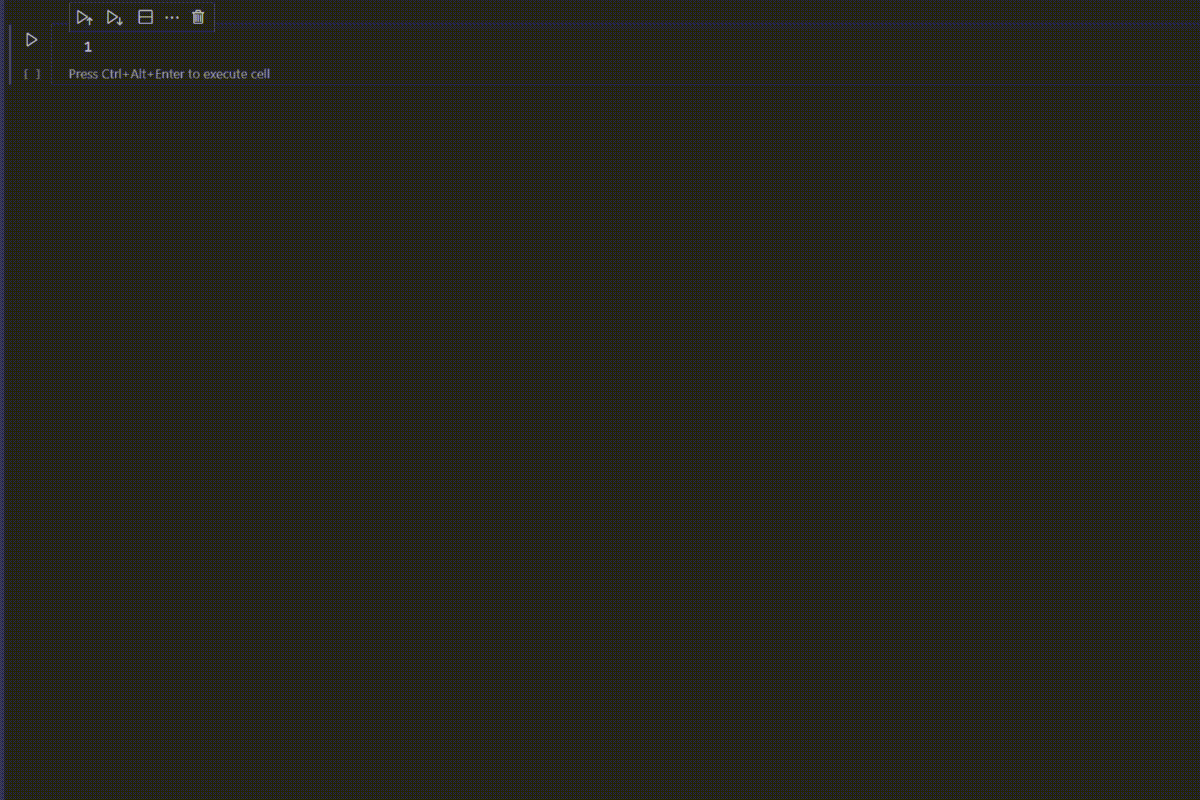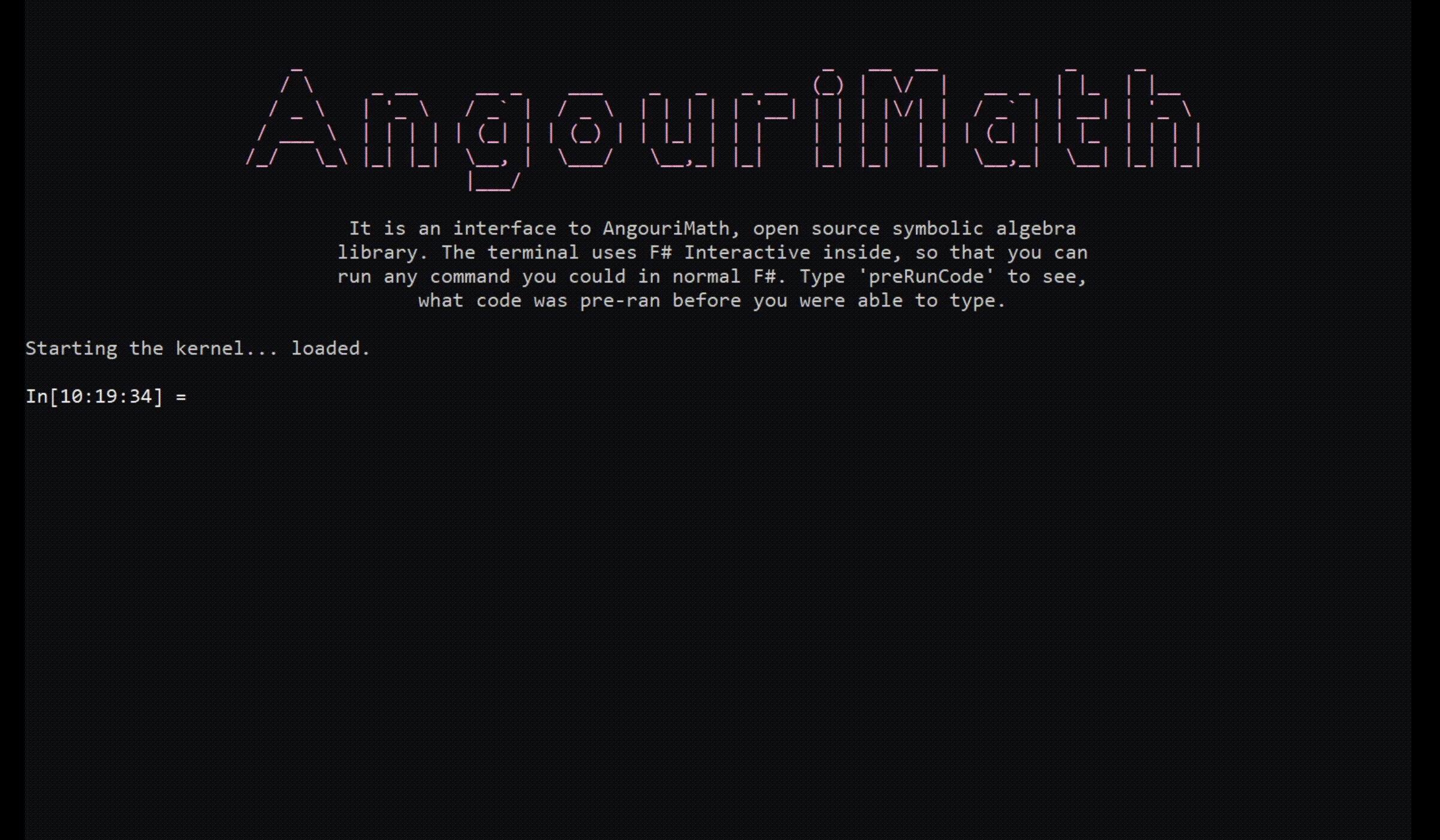New open-source cross-platform symbolic algebra library for C# · F# · Jupyter · C++ (WIP)
Get started
·
Examples
·
Contributions
·
What's new
·
Website



Status board
| Kernel/C# | F# | Interactive | C++ | |
|---|---|---|---|---|
| Build | ||||
| Test |
Note, that all tests and builds are tested for the following three operating systems: Windows, Ubuntu, Mac OS.
| Kernel/C# | F# | C++ |
|---|---|---|
| ??? | ??? |
| Kernel/C# | F# | Interactive | C++ | |
|---|---|---|---|---|
| Prerelease |  |
 |
 |
 |
| Stable |  |
 |
 |
WIP |
| Downloads |  |
 |
 |
WIP |
There are also latest-master versions (updated on every push to master) on MyGet:
| MyGet | Downloads |
|---|---|
 |
 |
 |
 |
 |
 |
Source to install from MyGet:
https://www.myget.org/F/angourimath/api/v3/index.json
| Website | Stars | License |
|---|---|---|
 |
 |
 |
If you want, you can add a badge to your repo:
[](https://am.angouri.org)
AngouriMath is an open source symbolic algebra library. That is, via AngouriMath, you can automatically solve equations, systems of equations, differentiate, parse from string, compile expressions, work with matrices, find limits, convert an expression to LaTeX, and many other things.
The two areas of use:
🧪 Research / Data Science [click 🖱️]
As F#, great first-functional language, skyrocketing in the area of data analysis and interactive research, AngouriMath offers a few ways to conveniently work with symbolic expressions.
Notebooks provide amazing experience working with function visualization, for functions over one and two variables. With dotnet/interactive, it can be used in Visual Studio Code notebooks as well as Jupyter notebooks. To install the package, simply run this in the notebook:
#r "nuget:AngouriMath.Interactive,*-*"
As both a demonstration sample and a convenient tool, this repository includes tool called AngouriMath.Terminal. It is a CLI-based program to interact with AngouriMath (as opposed to API-based interaction, that is, consuming it as a lib).
If you only need this program, here is the instructions how to build and run it:
git clone https://github.com/asc-community/AngouriMath
cd AngouriMath/Sources/Terminal/AngouriMath.Terminal
dotnet run -c release
See the online Jupyter notebook on
how to use the F# API of AngouriMath. Note, that the C# API is still available
via open AngouriMath command, then you can call the main library's methods.
See its source folder.
Read more about using AngouriMath for research on the website.
💻 Software Development [click 🖱️]
It is installed from nuget for both C# and F# and can be used by Web/Desktop/Mobile development.
- Install AngouriMath from NuGet.
- Write the following code:
using AngouriMath; using System;
Entity expr = "x + sin(y)";
Console.WriteLine(expr);- Run.
If you are new to AM, we suggest you checking out some samples instead of reading boring documentation. If you want to contribute, we would be happy to welcome you in our community.
For any questions, feel free to contact us via Discord.
Official website: am.angouri.org.
Expand any section to see. Examples with live shell are on the website.
Computations
Use as a simple calculator:
Entity expr = "1 + 2 * log(3, 9)";
Console.WriteLine(expr.EvalNumerical());Console.WriteLine("2 / 3 + sqrt(-16)".EvalNumerical());
>>> 2 / 3 + 4iConsole.WriteLine("(-2) ^ 3".EvalNumerical());Build expressions with variables and substitute them:
Entity expr = "2x + sin(x) / sin(2 ^ x)";
var subs = expr.Substitute("x", 0.3m);
Console.WriteLine(subs);Simplify complicated expressions:
Console.WriteLine("2x + x + 3 + (4 a * a^6) / a^3 / 5".Simplify());var expr = "1/2 + sin(pi / 4) + (sin(3x)2 + cos(3x)2)";
Console.WriteLine(expr.Simplify());Compiled functions work 15x+ faster
var x = MathS.Variable("x");
var expr = MathS.Sin(x) + MathS.Sqrt(x) / (MathS.Sqrt(x) + MathS.Cos(x)) + MathS.Pow(x, 3);
var func = expr.Compile(x);
Console.WriteLine(func.Substitute(3));var expr = "sin(x) + sqrt(x) / (sqrt(x) + cos(x)) + x3";
var compiled = expr.Compile("x");
Console.WriteLine(compiled.Substitute(4));Algebra
Start with boolean algebra:
Entity expr1 = "a and b or c";
// Those are the same
Entity expr3 = "a -> b";
Entity expr3 = "a implies b";Entity expr = "a -> true";
Console.WriteLine(MathS.SolveBooleanTable(expr, "a"));>>> Matrix[2 x 1]
>>> False
>>> True
Next, solve some equations:
Console.WriteLine("x^2 + x + a".SolveEquation("x"));Under developing now and forever (always available)
Entity expr = "(sin(x)^2 - sin(x) + a)(b - x)((-3) * x + 2 + 3 * x ^ 2 + (x + (-3)) * x ^ 3)";
Console.WriteLine(expr.SolveEquation("x").Latexise());Try some inequalities:
Console.WriteLine("(x - 6)(x + 9) >= 0".Solve("x"));Systems of equations:
var system = MathS.Equations(
"x^2 + y + a",
"y - 0.1x + b"
);
Console.WriteLine(system);
var solutions = system.Solve("x", "y");
Console.WriteLine(solutions);System:
Result:
var system = MathS.Equations(
"cos(x2 + 1)^2 + 3y",
"y * (-1) + 4cos(x2 + 1)"
);
Console.WriteLine(system.Latexise());
var solutions = system.Solve("x", "y");
Console.WriteLine(solutions);Calculus
Find derivatives:
Entity func = "x^2 + ln(cos(x) + 3) + 4x";
Entity derivative = func.Differentiate("x");
Console.WriteLine(derivative.Simplify());Find limits:
WriteLine("(a x^2 + b x) / (e x - h x^2 - 3)".Limit("x", "+oo").InnerSimplified);Find integrals:
WriteLine("x^2 + a x".Integrate("x").InnerSimplified);Sets
There are four types of sets:
WriteLine("{ 1, 2 }".Latexise());
WriteLine("[3; +oo)".Latexise());
WriteLine("RR".Latexise());
WriteLine("{ x : x^8 + a x < 0 }".Latexise());And there operators:
WriteLine(@"A \/ B".Latexise());
WriteLine(@"A /\ B".Latexise());
WriteLine(@"A \ B".Latexise());Syntax
You can build LaTeX with AngouriMath:
var expr = "x ^ y + sqrt(x) + integral(sqrt(x) / a, x, 1) + derive(sqrt(x) / a, x, 1) + limit(sqrt(x) / a, x, +oo)";
Console.WriteLine(expr.Latexise());
>>> {x}^{y}+\sqrt{x}+\int \left[\frac{\sqrt{x}}{a}\right] dx+\frac{d\left[\frac{\sqrt{x}}{a}\right]}{dx}+\lim_{x\to \infty } \left[\frac{\sqrt{x}}{a}\right]You can parse Entity from string with
var expr = MathS.FromString("x + 2 + sqrt(x)");
Entity expr = "x + 2 + sqrt(x)";A few convenient features: x2 => x^2, a x => a * x, (...)2 => (...)^2, 2(...) => 2 * (...)
Compilation
Now you can compile expressions with pritimives into native lambdas. They will be at least as fast as if you wrote them in line in code, or faster if you have same subexpressions in your expression.
Entity expr = "a and x > 3";
var func = expr.Compile<bool, double, bool>("a", "x");
WriteLine(func(true, 6));
WriteLine(func(false, 6));
WriteLine(func(true, 2));
WriteLine(func(false, 2));Output:
True
False
False
False
Multithreading
You are guaranteed that all functions in AM run in one thread. It is also guaranteed that you can safely run multiple functions from AM in different threads, that is, all static variables and lazy properties are thread-safe.
There is also support of cancellation a task. However, to avoid injecting the cancellation token argument into all methods,
we use AsyncLocal<T> instead. That is why instead of passing your token to all methods what you need is to pass it once
to the MathS.Multithreading.SetLocalCancellationToken(CancellationToken) method.
There is a sample code demonstrating cancellation:
var cancellationTokenSource = new CancellationTokenSource();
// That goes instead of passing your token to methods
MathS.Multithreading.SetLocalCancellationToken(cancellationTokenSource.Token);
// Then you normally run your task
var currTask = Task.Run(() => InputText.Text.Solve("x"), cancellationTokenSource.Token);
try
{
await currTask;
LabelState.Text = currTask.Result.ToString();
}
catch (OperationCanceledException)
{
LabelState.Text = "Operation canceled";
}F#
Not everything is supported directly from F#, so if something missing, you will need to call the necessary methods from AngouriMath.
open Functions
open Operators
open Shortcuts
printfn "%O" (solutions "x" "x + 2 = 0")
printfn "%O" (simplified (solutions "x" "x^2 + 2 a x + a^2 = 0"))
printfn "%O" (``dy/dx`` "x^2 + a x")
printfn "%O" (integral "x" "x2 + e")
printfn "%O" (``lim x->0`` "sin(a x) / x")
printfn "%O" (latex "x / e + alpha + sqrt(x) + integral(y + 3, y, 1)")
C++ (Experimental)
At the moment, AngouriMath.CPP is in the experimental phase. See how to get AngouriMath for C++.
#include <AngouriMath.h>
int main()
{
AngouriMath::Entity expr = "x y + 2";
std::cout << expr.Differentiate("x");
}AngouriMath is a free open-source project, there is no big company backing us. That is why we warmly welcome any contributors to the project. Aside from volunteer donations, you can help developing the project: check the guide for developers.
The project is open source, but can be used in closed commercial projects. There is no restriction on it with the only requirement to keep the MIT license with all distributives of AngouriMath.





